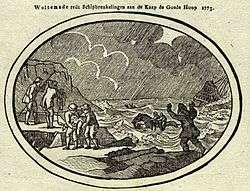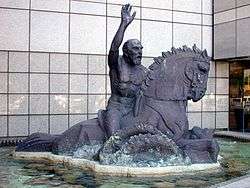Wolraad Woltemade

Wolraad Woltemade (c.1708 – 1 June 1773) was a Cape Dutch dairy farmer, who died while rescuing sailors from the wreck of the ship De Jonge Thomas in Table Bay on 1 June 1773.[1]
Early life
Woltemade was born in Hesse-Schaumberg, part of present-day Germany. He migrated to the Dutch settlement at Cape Town (Kaapstad) and worked for the Vereenigde Oostindische Compagnie (known in English as the Dutch East India Company) as a dairyman. Many of the earliest European colonies were established by commercial companies, rather than through the direct intervention of the governments of European nations. For example, note the history of the British South Africa Company.
Shipwreck
On the morning of 1 June 1773, near mid-winter in the southern hemisphere, a sailing ship named De Jonge Thomas[2] was driven ashore in a gale onto a sand bar at the mouth of the Salt River in Table Bay. Many lives were lost as the ship started to break up but a substantial number of survivors were left clinging to the hull. The stricken ship was not too far from dry land and many sailors attempted to swim ashore. Most of those who did so perished; the water was cold and the current from the nearby Salt River too great. Except for the very strongest swimmers, those who headed for the shore were carried out to sea.
A crowd of spectators stood on the beach. Some came to watch, others to try to help and yet others were hoping to loot the cargo that was being washed ashore. A detachment of soldiers was in attendance to keep order amongst the spectators. Corporal Christian Ludwig Woltemade, the youngest son of the elderly Wolraad, was amongst those standing guard. As daylight came, Wolraad left his home on horseback, taking provisions to his son.
Rescue
As he reached the beach, Wolraad was filled with pity for the sailors marooned aboard the wreck. Seeing that nothing could be done by those on the beach, he mounted his horse, Fleur, and urged the animal into the sea. As they approached the wreck, Woltemade turned the horse and called for two men to jump into the sea and grasp the horse's tail. After a moment of hesitation, two men threw themselves into the water and did so, whereupon Woltemade urged the horse forward and dragged them to shore. Wolraad rode out seven times, bringing back fourteen men. By this time he and his horse were exhausted, but at that moment, as they rested, the ship began to collapse. Wolraad once more urged his horse into the water but by now the desperation amongst the sailors was tremendous. Seeing this as probably their last chance to escape before the ship was destroyed, six men plunged into the sea, grabbing at the horse. Their weight was too much for the exhausted steed; all were dragged below the waves and drowned.[3]
Woltemade's body was found the next day, but the horse was not found.
Of the 191 souls on board, only 53 survived and of these 14 were saved by Woltemade.
Honour

Woltemade immediately became a hero. The Dutch East India Company provided amply for his widow and children and named a ship Held Woldemade, taken by the British fleet as prize during the battle in Saldanha Bay on 4 July 1781. A suburb of Cape Town is named after him. The Union of South Africa King's Medal for Bravery, instituted in 1939, bore a depiction of Woltemade's heroic act on its obverse. In 1970 the Woltemade Decoration for Bravery was instituted as the highest civilian decoration for bravery in South Africa. This was replaced in 1988 by the Woltemade Cross for Bravery. The Woltemade Cross was discontinued in 2002, as part of the move towards establishing a new South African honours system, following the advent of majority rule.
The name also was given to the S.A. Wolraad Woltemade, one of a pair of salvage tugs built in 1976, which at the time were the most powerful tugs in the world.[4]
The name
In old Dutch Wolraad means "good advice" or "well counselled". Woltemade is more problematic. It is possible to interpret it as "well made".
Notes and references
- ↑ Most of those whose mother tongue is English will have difficulty pronouncing his name. Try VOLL (rhymes with knoll) RARD (rhymes with bard) VOLL TER MARDER).
- ↑ Roughly, the young, or the younger Thomas
- ↑ Hammond, Peter (2003). "Wolraad Woltemade". Africa Christian Action. Retrieved 23 June 2010.
- ↑ "New South African Standby Tug Contract Awaited" (PDF). Tugs & Towing News. 22 November 2009. p. 5. Retrieved 22 June 2010.
See also
Union of South Africa King's Medal for Bravery
External links
| Wikimedia Commons has media related to Wolraad Woltemade. |
References
- ^ Schirmer, P. 1980. The concise illustrated South African encyclopaedia. Central News Agency, Johannesburg, about 211pp.